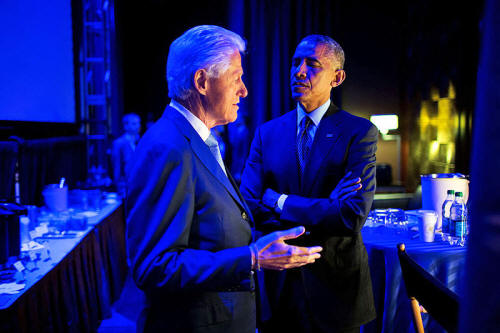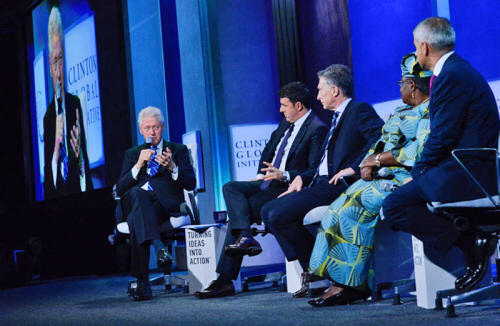|
from NYTimes Website
President Barack Obama speaks with former President Bill Clinton backstage prior to delivering remarks during the Clinton Global Initiative in New York
Last week, the globalists had a big 'family' reunion in New York.
The gathering was focused on the United Nations General Assembly, but a growing array of side conferences and summits and dinners also attracted concerned internationalists of every stripe:
Former President Bill Clinton speaking at the annual meeting of the Clinton Global Initiative in New York this month. Credit Stephanie Keith/Getty Images
But an absence haunted the week.
Almost by definition, nationalists and localists are underrepresented at these global gatherings.
Their paucity was especially notable this time, because the rising signs of nationalism - whether in the form of,
...hovered like a specter over many of the discussions.
The globalists have lofty aims, of course, like working toward,
But there seemed to be a growing realization that solving the problems of the world's commons becomes harder when the globalists neglect their own backyards.
Again and again, in private conversations and in public forums, the globalists spoke of feeling besieged.
Take the valedictory address of former President Bill Clinton, the paterfamilias of the globalist reunion. The Clinton Global Initiative is one of the major factors in helping to transform what had been a week centered on United Nations diplomacy into a broader Davos-on-the-Hudson for international aspirations.
Mr. Clinton spoke of the globalist vision of a "nonzero-sum" world in which everyone wins together and of how that idea was under attack by "zero-sum" tribal politics.
In a discussion Mr. Clinton moderated on shared prosperity, his four guests were esteemed globalists.
The panel included,
Mr. Clinton told Mr. Khan that he was,
But the panel's insight was limited by the absence of anyone who could explain populist ire with authenticity - who could explain why, as Mr. Clinton put it,
The advocates of a more densely enmeshed world seemed caught in a bind.
Their project has long been to get people to enlarge the sphere of their worry, to look beyond national boundaries.
But now more than ever, neglect the unemployed workers in the Rust Belt, or ignore the dissatisfaction with Europe in northern England, and it becomes harder to help Syrian refugees or thwart climate change.
I asked Mr. Clinton after his conference about the challenge of balancing help for Kenya with care for Kentucky, in an age when Kentucky anger threatens to push the United States toward less engagement in foreign problems.
But he sought to deny the inevitability of tension between globalism and nationalism, pointing to the example of a program he recently visited that was building nano-satellites at Morehead State University in eastern Kentucky.
Kentucky benefits from the program, but so, he argued, might Kenya, where the satellites could, for instance, detect and help combat the trade in phony medicines.
|



